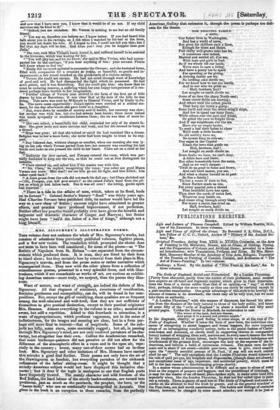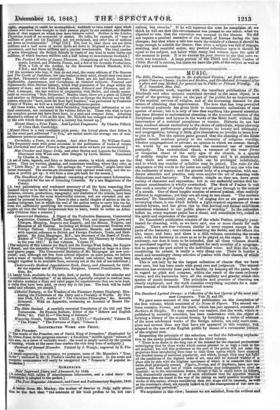PUBLICATIONS RECEIVED.
BOOBS.
Lie and Letters of Thomas Campbell. Edited by William Beattie, M.D., one of his Executors. In three volumes.
.4P and Times of Alfred the Great. By Reverend J. A. Giles, D.C.L., late Fellow of C. C. C., Oxford, Author of " History of the Ancient Bri- tons," &c.
Original Treatises, dating from XIIth to XVITIth Centuries, on the Arts of Painting in Oil, Miniature, Mosaic, and on Glass; of Gilding, Dyeing, and the Preparation of Colours and Artificial Gems; preceded by a Gene- ral Introduction; with Translations, Prefaces, and Notes. By Mrs. Merri- field, Honorary Member of the Academy of Fine Arts, Bologna; Translator of the Treatise on Painting of Cennino Cennini, and Authoress of " The Art of Fresco-Painting." In two volumes.
Jealousy; a Novel By the Author of "Five Years in the East,"_&c. In three volumes.
The Evils of England, Social and Economical. By a London Physician. [Partly from character, partly from the nature of their profession, some medical men acquire an off-hand and dogmatic manner, which gives to their determina- tions the form of a decree rather than that of an opinion,—a " way" in which they, perhaps, indulge the more readily as they can rarely be confuted except by a post-mortem examination. One great advantage of this style is its brevity: the absence of reasons is its drawback; the views may all be very true, but we must take them on authority.
" A London Physician," with this manner of discourse, has turned his atten- tion from the diseases of the body natural to those of the body politic, and tosses off some fifty of the "evils, of England" in about a hundred and fifty small printed pages. Unlike the Doctor in Macbeth, he undertakes to cast
"The water of the land, find her disease, And purge It to a sound and pristine health."
In his diagnosis, charity, or good feeling in some shape, is at the root of The Evils of England. Whether it takes the form of poor-laws, the individual cha- racter of almsgiving to street beggars and house beggars, the more imposing shape of an investigating mendicity society, lurks in the genial fashion of Christ- mas-boxes and donceurs, or shows itself in supporting thieves in comparative luxury instead of whipping them well, matters not. In every case it lessens the fund for the employment of honest labour, leads frequently to sensual indulgence and drunkenness of the grossest kind, encourages the lazy at the expense of the in- dustrious, and induces a habit of extraneous reliance. The main cure for this main evil is short if not sweet—abolish poor-laws, cease to give, stand steadily upon the "sternly merciful precept of St. Paul, 'if any will not work neither shall he eat.' " The only exceptions that the London Physician would tolerate in his rule of quid pro quo, are hospitals and dispensaries, (though these are abused,) and exceptional cases of age, impotence, and accidental poverty, which must be left in the last resource to discriminating private charity. In a matter whose administration is so difficult and so open to abuse of every kind as the support of paupers and beggars, and the punishment of criminals, it is easy for the master of an offihand, plain-spoken style, to make some hard hits, especially when, like the London Physician, he does not feel called upon to point Out a remedy. There is plenty of such hits in The Evils of England; and some re- marks on the attempt to feed the Irish by grants, and on the general mischief of the Poor-laws, are well worth consideration. The habits and feelings of centuries cannot, however, be changed by some smart attacks; nor would it be just or
right, supposing it could .be accomplished, suddenly to turn round upon whole classes who have been brought to their present plight by our conduct, and deprive them of that support on which they have hitherto relied. Neither is the London Physician much of an economist or statist. He talks, for example, of "tens of millions of good soil (in England) not yet reclaimed, and other tens of millions set down as irreclaimable." (Page 113.) The fact is, that there are not three millions and a half acres of waste lands set down in England as capable of im- provement, and but three millions and a quarter irreclaimable. The total number of acres throughout the British Islands in waste of any kind is ander thirty-one millions, of which fourteen millions and a half belong to mountainous Scotland.] The Poetical Works of James Thomson. Comprising all his Pastoral, Dra- matic, Lyrical, and Didactic Poems, and a few of his Juvenile Productions. With a Life of the Author, by the Reverend Patrick Murdoch, D.D., F.R.S.; and Notes by Nichols. [Of the numbers who buy, if they do not read, the many editions of The Seasons and The Castle of Indolence, few can realize to their mind, should they even know the fact, Thomson's other poetical works. There are his half-dozen dramas- Soplzonisba Agamemnon, and Coriolanus, on classical subjects; Tancred and
Sigtsmundc;, from Sicilian history, which kept possession of the stage within the memory of man; and two from Fnglish annals, Edward and Eleonora, and Al- fred, a masque; the last written in conjunction with Mallet, and chiefly memo- rable as containing "Rule Britannia." Besides these, there are a poem on Liberty
and another on Britannia, both meant to reflect on George the Second and his Mi- nisters, when the " bard, more fat than bard beseems," was patronized by Frederick Prince of Wales; as well as a variety of miscellaneous poems. All these works, with many notes furnishing biographical information or cri- tical comments, are contained in the volume before us. Those who wish to have the complete poems can have them here, in a neat and compact form. Adopting Murdoch's edition of 1762 as his base, Mr. Nicholls has enlarged and improved it by the aids which three-quarters of a century has turned up.] Mount Sinai; a Prize Poem. And Lyrical Fragments. By Charles Piffard, of Clare Hall, Cambridge.
Ckfount Sinai is a very creditable prize poem: the lyrical pieces that follow it, for the most part addressed " to Eva," are rather above the average run of mis- cellaneous poems in smoothness.] Corindale; a Poem, in six cantos. And other Poems. By William Count. [We frequently meet with great mistakes in the publication of books of verses, but Corindale and other Poems is the greatest error we have yet encountered.] Nut-Cracker and Sugar-Dolly, and other Stories and Legends for Children. Illustrated with Wood-cuts after Designs by Lewis Richter. Translated by Charles A. Dana.
[A set of tales, legends, and fairy or fabulous stories, in which animals are the actors. They are various, pleasing, and sometimes touching, where they refer, as in " Little Mary," to real life: but perhaps the " marvellous " might have been better managed. The stories are illustrated with spirited wood-cuts, and the vo- lume is prettily got up: it will form a nice gift-book for the season.] The Handbook for New Zealand: consisting of the most recent Information. Compiled for the use of Intending Colonists. By a late Magistrate of the Colony. [A very painstaking and condensed summary of all the facts respecting New Zealand likely to be useful to the intending emigrant. The history, capabilities, divisions, climate, productions, topography, and statistics of the islands, have been drawn together from the most trustworthy sources, and are corrected and ani- mated by personal knowledge. There is also a useful chapter of advice to the in- tending emigrant, but in which the zeal of the author seems to carry him too far, from not sufficiently qualifying his recommendations. The person who should acquire all that the writer recommends him to learn, would be rather an Admi- rable Crichton than a colonist.] Commercial Statistics. A Digest of the Productive Resources, Commercial Legislation, Customs Tariffs, Navigation, Port, and Quarantine Laws and Charges, Shipping, Imports and Exports, and the Monies, Weights, and Measures of all Nations. Including all British Commercial Treaties with Foreign Nations. Collected from Authentic Records, and consolidated
with especial reference to British and Foreign Products, Trade, and Navi- gation. By John Macgregor, MY., late Secretary of the Board of Trade; Author of " The Progress of America, from the Discovery by Columbus to the year 1847." In four volumes. Volume IV.
[The subjects of this volume are Hayti and the Foreign West Indies, the Empire of Brazil, and the statistics of Oriental Commerce, displayed at large in a thou- sand quarto pages. The Commercial Statistics of Mr. Macgregor are now com- pleted; and, although not free from critical objection on some points, we believe such a mass of various information, both textual and tabular, has rarely been brought together in an available form, certainly not at the risk Of one individual.] Underwood's Medical Appointment-Book, Diary, and Abnanack, for 1849; for the especial use of Physicians, Surgeons, General Practitioners, Den- tists, &c. [A handy book, available for the table, desk, or pocket. Besides the calendar and " miscellaneous information " of an almanack, especially adapted to medical men, the volume contains a diary and ruled pages for appointments that are to be kept, or visits that have been paid, on every day in the year. The book will be found useful and efficient, yet simple.] Celestial Scenery; or the Wonders of the Planetary System Displayed; illus- trating the Perfections of the Deity and a Plurality of Worlds. By Tho- mas Dick, LL.D., Author of " The Christian Philosopher," &c. Seventh thousand. With an Appendix, containing an Account of Recent Dis- coveries.
The Bible Revised. A carefully corrected Translation of the Old and New Testaments. By Francis Barham, Editor of the " Hebrew and English Bible," &c. Part The Song of Solomon."
Waverley Novels, Volumes XXIII. to )CCVI.—" Kenilworth," Volume IL "The Pirate." " The Fortunes of Nigel," Volume I.
ILLUSTRATED WORK AND PRINT.
The Preacher.
[" The words of the Preacher, son of David, King of Jerusalem," illuminated by ills Owen Jones, in his gorgeous manner: a handsome " middle-ageish" volume, of folio size, in a cover of veritable wood: the wood is deeply carved by the process of burning, which at the same time confers the rich deep tone of antiquity.] Portrait of Samuel Maunder. Painted by J. Waugh; engraved by E. Fm- den.
[A small engraving, to accompany, we presume, some of Mr. Maunder's " Trea- suries "; executed in Mr. E. Findeu's careful and neat manner. In the acute and energetic countenance will easily be recognized the " Treasurer" of popular in- formation.] ALMANACKS.
Rees' Improvedirar;rand A imanack„ for 1849.
[A calendar with tables of miscellaneous information, and a ruled diary: the publication ia adapted to the pocket.] The.Pod,afsgari#e Almanack, and Court and Parliamentary Register,1849.
A letter from Mr. Morley, the author of Sunrise in Italy, calls atten- la= to the fact that "the contents of his book profess to be, not nar- ratives, but reveries." If he will reperuse the note be oomplains 01; we think he will see that this circumstance was present to our mind: what we objected to was, that the execution was unequal to the themes. We did not require a poetical narrative of the history of Europe during the Into changes; but that when a tale was made the vehicle of a theme, it should be large enough to exhibit the theme; that when a subject was full of strange, startling, and resultful action, any poetical reflections upon it should be equal to the subject, not below what many had written upon the spur of the moment in prose. It is no excuse for poor reverie to say that mere re- verie was intended. A large portion of the Third and Fourth Cantos of Chikle Harold if, reverie, but there we have the pith of the subject as well as the pithy comment.



























 Previous page
Previous page